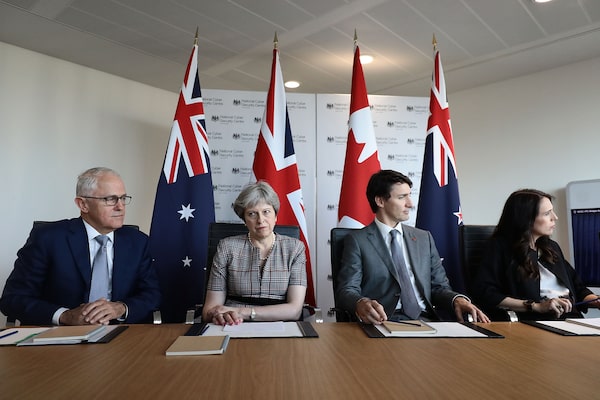
Australian Prime Minister Malcolm Turnbull, British Prime Minister Theresa May, Canadian Prime Minister Justin Trudeau and New Zealand Prime Minister Jacinda Ardern attend a meeting at the National Cyber Security Centre on April 18, 2018 in London, England.Jack Taylor/Getty Images
Prime Minister Justin Trudeau has joined with the leaders of three key Western allies in condemning Russia’s involvement in cyberattacks and its role in the poisoning of a former double agent in Britain.
Mr. Trudeau and the Prime Ministers of Britain, Australia and New Zealand lashed out at Russia on Wednesday, saying it had been “using cyberwarfare as part of a wider effort to attack and undermine the international system.” Their intervention came on the eve of the Commonwealth leaders summit, which is expected to focus on cybersecurity as a main topic.
“There are folks out there in the world, countries out there in the world who do not share our values and our approach to freedoms and mostly the rules-based order,” Mr. Trudeau told the other leaders during an intelligence briefing at the National Cyber Security Centre in London. “So the importance of like-minded friends and partners like us four to stand together … provides a response and a solidarity that is a clear message to those around the world who do not play by the same rules.”
The four countries are part of the so-called Five Eyes security alliance, which also includes the United States. British Prime Minister Theresa May called the alliance “a unique security and intelligence-sharing partnership” that “has done much to protect our people from a range of threats.” Citing repeated Russian hacking, she added: “I have been clear to Russia that we know what it is doing. And we should be in no doubt that such cyberwarfare is one of the great challenges of our time.”
Ms. May has also put cybersecurity on the agenda for the two-day Commonwealth meeting and announced that Britain will commit £15-million ($27-million) to help smaller, and poorer, Commonwealth countries develop computer technological capabilities to tackle criminal groups and “hostile state actors.”
In a private meeting earlier in the day, Mr. Trudeau also offered Ms. May Canada’s support for the recent missile strike on Syria by Britain, United States and France in response to an alleged chemical weapons attack by the Syrian military with Russia’s backing. The leaders agreed the missile strike “was the right thing to do and necessary to uphold the global prohibition on chemical weapons use,” according to a summary of the meeting provided by Downing Street officials. “They agreed to continue standing side by side to uphold international norms and the rules which keep us safe.”
Relations between Russia and the West have sunk to a low not seen since the end of the Cold War. Allegations of computer hacking, interference with elections and recent fears the Russian government has targeted routers many people use at home, have only increased the mistrust. Last month’s poisoning of former spy Sergei Skripal and his daughter, Yulia Skripal, in Salisbury worsened relations further and sparked an international diplomatic row. British investigators said the two were exposed to a type of nerve agent known as Novichok that was developed in the Soviet Union in the 1980s. Britain’s findings have been backed up in an analysis by the UN’s Organization for the Prohibition of Chemical Weapons, although it did not identify where the chemical came from. Western allies, including Canada and the United States, have rushed to Britain’s side and joined in the expulsion of more than 150 Russian diplomats.
Russia has denied any involvement in the case and insisted that it has never developed Novichok. Moscow also retaliated with an equal number of diplomatic expulsions and it has challenged the findings of the UN watchdog, with officials suggesting traces of a Western-made nerve agent had been found. That drew a sharp rebuke on Wednesday from the head of the OPCW, Ahmet Uzumcu, who said the Western nerve agent was used in a control sample and had nothing to do with the Skripal case.
The Skripals have miraculously survived the attack but have become pawns in the saga. Mr. Skripal, 66, remains in serious condition in hospital but Ms. Skripal, 33, has been released. She has issued a handful of statements through London police requesting privacy and declining help from the Russian embassy. That prompted Russia’s Ambassador to Britain, Alexander Yakovenko, to allege that she was being held hostage by the British. He has also been waging a public relations campaign with weekly news conferences denouncing the British probe.
On Wednesday, Ms. May stood by Britain’s conclusion and said only Russia could have carried out the poisoning. Mr. Skripal was a potential target because he worked as a Russian military intelligence officer in Moscow during the 1990s when he also spied for Britain’s MI6. He was arrested in 2004 and sentenced to 13 years in prison for treason but won release in 2010 and moved to Britain as part of a spy swap. “Recent global events have served to underline the need for nations to stand together in the face of those who would challenge the rules-based international order,” she said.
 Paul Waldie
Paul Waldie